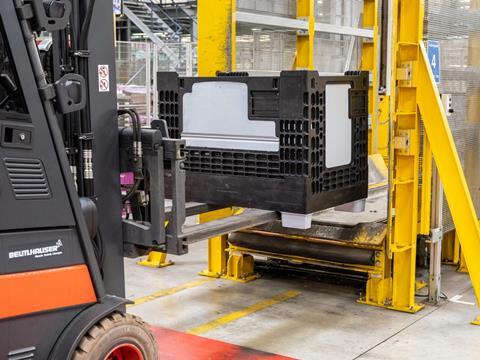
BMW Group has announced a series of projects aimed at introducing more recycled and bio-based content into its packaging alongside reducing the carbon emissions across its supply chain by 20% per vehicle.
According to BMW Group, the new projects include increasing the recycled content in its packaging, using alternative sustainable materials, reducing single-use packaging, introducing lightweight packaging in certain areas, and reducing transport volumes.
The company claims it is monitoring the impact of individual measures via a CO2 calculator for packaging. The overall aim is to reduce CO2 emissions in the supply chain by 20% per vehicle compared to 2019.
BMW Group says it is aiming to increase the proportion of recycled material in its reusable logistics packaging from 20% to 35% for newly awarded contracts. The company adds that its recently developed expanded polypropylene (EPP) packaging containers, which can be adapted to the components being packaged, currently comprise 25% recycled content. With around 360,000 of these containers needed each year, using 25% recycled material will reportedly allow BMW Group to save almost 280 tonnes of CO2 annually.
In addition, BMW Group says it is planning to further increase the proportion of recycled content in its EPP packaging, with the first pilot schemes using 100% recycled material apparently underway. This configuration will become standard for new contracts from 2024 if the tests are successful, according to the company.
BMW Group adds that an additional 680 tonnes of carbon emissions savings can be made every year by using covers and small load carriers with 50% recycled content. The company says that measures to increase recycled content in its packaging will be focused within European markets due to the current waste management situation and available recycling infrastructure. However, the company is currently working on expanding these solutions to further locations in Mexico, the USA, and China.
In terms of reducing transport volumes, BMW Group says it is also planning to introduce folding large load carriers in a plastic format made from over 90% recycled material, instead of pallet cages made of steel. When empty, these large load carriers can be folded, apparently making them easier to transport. The company claims that using 15,000 of these new containers would reduce CO2 by around 3,000 tonnes per year.
BMW Group says it is also launching pilot projects using bio-based materials to replace oil-based substances polyethylene (PE) and polypropylene (PP). The company is apparently investigating whether and in what ways it can use materials from recycled household appliances in its packaging, with the long-term aim to use alternatives to raw materials across the board.
Michael Nikolaides, head of production network and logistics at BMW Group, comments: “Our ‘re:think, re:duce, re:use, re:cycle’ approach is being implemented consistently in packaging logistics, too. We’re using innovative strategies to consistently reduce the volume of resources we use, thus reducing our carbon footprint.
“We in Logistics are also doing our part to get the BMW iFACTORY up and running – with a particular focus on the ‘green’ side of things.
“BMW iFACTORY. LEAN. GREEN. DIGITAL. is the strategic vision for the global production network, with an emphasis on flexibility and efficiency, sustainability and digitalization. It provides an answer to the challenges involved in the transformation to e-mobility and takes a global approach. ‘Green’ means leveraging the latest technologies to create a production process that uses minimal resources.”
BMW Group has also signed a supply agreement with H2 Green Steel for hydrogen-based, green steel produced at its plant in northern Sweden.


















No comments yet